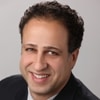
Anthony Guerra, Editor-in-Chief, hsCIO.com
Everyone involved knew it was a very serious crisis, though it is only with hindsight we can say it was the most serious crisis of the Cold War and, thus, the moment (up to that date) the world had come closest to nuclear annihilation.
And in that moment, upon hearing news that brought the crisis to its boiling point, the President of the United States was clearly flustered. This amazing audio I heard while watching “JFK,” an installment of the truly exceptional American Experience series of documentaries.
It was Oct. 27, 1962, in the midst of the Cuban Missile Crisis, and John F. Kennedy was in the White House. An audio recording captures someone informing the president that an American U2 spy plane — which had been taking pictures of still-being-installed Soviet nuclear missile launch sites in Cuba — had been shot down. Kennedy, who had been playing for time and holding his more hawkish advisors at bay, could not express his response clearly, starting sentences that faded off midway.
The leader of the free world, and the man who was known for his eloquence, could barely speak.
Those who were familiar with the earlier Bay of Pigs fiasco would not have been shocked. In that case, Kennedy went forward with a half-baked plan to overthrow Fidel Castro which had been formulated by the CIA under his predecessor, Dwight Eisenhower. Unfortunately, Kennedy was quite green when taking office, and took the word of folks in the CIA that everything was under control. Other presidential advisors, thinking the CIA was on the hook, declined to warn the president that there were serious flaws in the plan, and Kennedy had yet to gain the savvy needed to discern silence from endorsement.
As a result, the operation was a disaster from the start. Kennedy, who had wanted to keep the whole thing as quiet as possible, would not attempt to salvage the situation by escalating the operation through allowing US airstrikes on the beach. Thus, almost everyone involved was killed or imprisoned. Of course, the US’s role in the attack was ultimately revealed, leaving Kennedy with one huge black eye.
Luckily for the world, the Cuban Missile Crisis came later in his administration, after the painful Bay of Pigs lessons had been learned. After the failed invasion, Kennedy had met with Eisenhower, asking him how he (Kennedy) could have made such errors. Eisenhower suggested it was the fact that he never got all the appropriate people in the same room, in front of the president, and let them hash out their recommendations. All of Kennedy’s conversations, Eisenhower pointed out, had been one-on-one and thus fragmented.
With Eisenhower’s advice, Kennedy revamped the decision-making process, which ultimately led to the formulation of EXCOMM (the Executive Committee of the National Security Council — the nine members of the National Security Council and five other key advisors). So although he got punched in the stomach when learning the U2 plane has been shot down, this group helped him regain his composure, keep the hawks at bay, and, as a consequence, provide enough time and space for he and Khrushchev to bring this most dangerous of dances to a quiet conclusion. (The Soviets agreed to remove their missiles from Cuba and the US — secretly — agreed to remove its now-redundant Jupiter missiles from Turkey.)
The bottom line is that no leader is perfect, but experience, combined with sound governance and structure, can go a long way to helping you make good decisions. Try to consider all possible outcomes of your actions (Kennedy certainly should have been prepared for one of his spy planes being shot down) so you’re ready to take the next action, but always maintain your flexibility. Try to bring your best advisors together so all can hear each other’s points of view, so each has to make their case to the others. And finally, don’t doubt your strength if you are momentarily thrown for a loop — it’s happened to the best of us.


Share Your Thoughts
You must be logged in to post a comment.